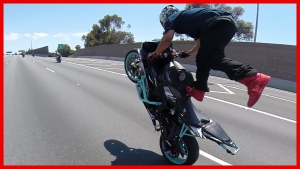How To Avoid Motorcycle Accidents
The best way to prevent becoming the next motorcycle accident statistic is to pay attention to safety. Numerous motorcycle collisions can be prevented by consistent attention and education about the safest way to ride a motorcycle. Here are some of the most essential safety tips to keep you riding on the road for years to come. 1. Wear a helmet. 2. Get a motorcycle license. 3. Get professional training. 4. Don't drink and ride. 5. Wear protective clothing. 6. Maintain your bike. 7. Don't share lanes. 8. Know your skill level. 9. Learn about the common causes of motorcycle accidents. 10. Avoid road hazards. If you are in a motorcycle collision and wish to obtain compensation for your injuries or other losses, think about consulting with a lawyer for information or representation.
For many skilled motorcycle riders, safety is a "first priority". Most bikers understand that riding a motorcycle is more hazardous than operating a car. When motorcycle collisions do occur, the results can be very critical. The federal government stated, per mile traveled in 2006, there were 35 times extra deaths from motorcycle collisions than from car collisions. Emergency room staff often associate motorcycles as "donor mobiles."
Evidence implies that wearing a motorcycle helmet greatly lessens the frequency of head injuries in accidents. The National Highway Traffic Safety Administration states, for every 100 motorcyclists killed in a crash while not wearing a helmet, 37 would have survived if they had been doing so. That doesn't even count the substantial decrease in non-fatal injuries produced by helmets. Make sure your helmet fits Department of Transportation standards and have one ready for passengers. Keep in mind that in several states it's illegal to ride without a helmet.
Most states require that bikers get a motorcycle license in order for them to ride on the roadways. Typically, riders must pass a knowledge test and a skills test. Some states expect bikers to also take a motorcycle safety class. Going through these hoops pays off when it comes to road safety. In 2001, more than one-quarter of all motorcyclists killed in accidents did not have a motorcycle license.
Motorcycle riders who are educated or trained by friends account for more than 90 percent of bikers in motorcycle accidents. Getting professional instruction in motorcycle riding might just save your life.
About 50% of the collisions concerning a single motorcycle are produced by speeding or alcohol use, usually, these go "hand in hand". Not only is it against the law to drink and ride a motorcycle, it's also very dangerous.
Protect yourself by using goggles or sunglasses, a jacket, full- fingered gloves, long pants, and boots (without wear). Your clothes should be made of a abrasion-resistant material, (for example leather), and fit tight to the body. Loose apparel can reduce your vision. Choose bright colors so that other riders can recognize you.
Making sure your motorcycle is in great running condition is of the highest importance to safety. Don't limit your maintenance to the engine and brakes or normal things. Regularly check your tires (and tire pressure), headlamps, turn signals and other gear that you wouldn't usually check.
Cars don't anticipate sharing a lane with other types of vehicles. Drivers tend to watch for cars in different lanes and usually won't see a motorcycle sharing a lane with them. Motorists might make a fast lane change or stray to one side, with severe consequences to the motorcycle rider.
Know your abilities, and ride respectively. Riding on the road is not the time to experiment with your expertise or to exceed your skill level.
Knowledge is your buddy. Learn about most general conditions that lead to motorcycle collisions. Think of ways you could evade those circumstances, take note when those conditions might occur, and when you are in those circumstances, take extra caution.
Road hazards, including debris in the road or slippery conditions, are more severe for motorcycles than for automobiles and can lead to critical injuries. Some situations that are hazardous to bikers are not readily known. Take the time to educate yourself about the many road hazards and learn how to control your bike carefully and safely when presented with those hazards.



